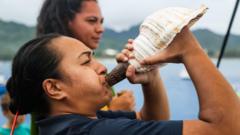In the stunning blue expanses of the Cook Islands, a controversial initiative is being pursued — mining polymetallic nodules from the seabed. These nodules, rich in essential metals like cobalt, nickel, and manganese, could power the electric revolution. However, environmental activists voice serious concerns about the potential damage to fragile ocean ecosystems.
Jean Mason, a local museum curator, refers to these nodules as “the future of our country,” believing their extraction could lead to unprecedented prosperity for the islands. Prime Minister Mark Brown strongly supports this mining venture, seeing it as vital for financial independence and improved living standards. He envisions creating a sovereign wealth fund, similar to Norway’s, providing education and healthcare opportunities for islanders.
However, critics such as Alanah Matamaru Smith from the Te Ipukarea Society argue there is not enough research on the long-term ecological impacts of deep-sea mining, calling for a moratorium until comprehensive studies are conducted. Locals, including those from smaller islands, express concerns over community consultations that often silence dissenting voices.
Promoters of the mining initiative suggest that this venture is a necessary risk, stating, “nothing we do in life is risk-free.” Meanwhile, beachgoers rally for protection of their ocean, echoing calls for more time and independent research before proceeding.
While the local government moves ahead, allowing companies to explore these underwater treasures, the debate continues: Is seabed mining a critical economic strategy or a perilous gamble for the future?





















